There is no ‘standard’ brigade however, here’s a cross-section of brigades and their running costs.
James Heappey, Minister of State at the Ministry of Defence, responded:
“There is no ‘standard’ brigade however, we can provide running costs for a cross section of the Army’s capability in financial year 2021-22. The workforce and activity costs to maintain the following brigades at routine levels of readiness, and at full strength, are as follows:
4th Infantry Brigade (to become 4th Light Brigade Combat Team) (which does not include Engineers or Artillery) costs c£140 million p.a.
20th Armoured Brigade Combat Team (including attached Engineers and Artillery) costs c£300 million p.a.
102 Logistic Brigade’s costs are similar to that of a light brigade at c£150 million p.a.
These figures are inclusive of pay and operating costs (fuel, rations, travel and ammunition) however, due to the way in which the Army measures and forecasts its spend, it has not been possible to include infrastructure, utilities and equipment running costs at brigade level.”
What is a brigade?
According to the National Army Museum, a Brigade is a formation consisting of three infantry battalions or three cavalry or armoured regiments. During the world wars, a brigade numbered between 3,500 and 4,000 men.
“When forming part of a division, a brigade has no internal support. But when operating independently (usually called a brigade group), it includes supporting reconnaissance, artillery, engineers, supply and transport. A brigade is commanded by a major-general or brigadier.”


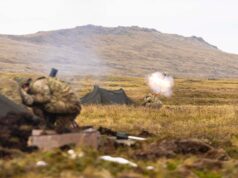
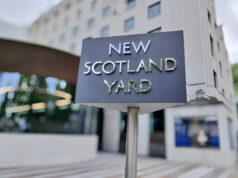

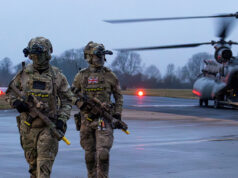
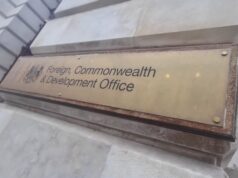



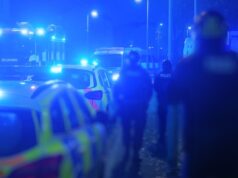


Very good value for money in my book.
I’m not sure how you define value for money here. They certainly aren’t defeating anyone because we are not actively at war – we probably are deterring but really only as part of NATO. It is also perhaps true to say that the biggest costs are kit and we perhaps need to update much of that. Knowing the cost is really only useful if you are going to cut or add forces. If you are going to add then you need to consider recruitment difficulties etc. etc. Interesting to know but does this get us any further forward.
We are not at war because of these troops.😅
The army does not just exist to conduct warfighting – that is a very, very small part of a soldiers career. Just as firefighters spend very little time (overall) fighting fires and police officers very little time arresting criminals.
So what if we are deterring as part of NATO? We are in NATO – that’s what we do.
Much time is spent by army folk on defence diplomacy, deterrence missions, training foreign armies, MACA/MACM – which are all very good outputs.
Of course a massive amount of time is spent in personal and collective training, equipment maintenance, admin – which you might not count as an output but is essential anyway.
Oh, that’s a shame, I was expecting the entire Bde ORBAT not just 3.
Some of you pongo types will know better than me but a mate has told me that a lot of the infantry regiments are massively undermanned so while they have X number of platoons, companies etc on paper, they’re far from full strength. Maybe part of why they have cherry picked which units to use, dunno.
Yes, it’s true. 5(?) Bns have been reduced to reinforced company size for the SFAB, others are at reduced establishment. I’d also read of a cynical explanation for the SFAB that they could then use the saved headcount to beef up some of the understrength formations.
Considering the army has 17 ( off my head there may be more I miss ) Bde sized formations, some of which are termed “Groups” then listing just 3 means the problem is out of control! So I doubt that is the reason.
The BCT title I find strange. They are Brigades. I think it is another term we copy the Americans with.
I have the Fijian regiment near me. Sorry I mean 2Scots😂😂😂
If that’s what’s needed to keep to strength then that’s what’s needed.
Personally I think recruitment could do wonders if it would take people instantly instead of these massive waits.
So if am a young person who wants to get away from home I can get accommodation that night or next day and start the process soon after.
Scots Battalions have been well below strength for years I read.
Which is why there was anger when fully subscribed English battalions like the Fusiliers got it in the neck to keep playing to the politics and keeping Scottish Battalion names alive.
But it is a “British” Army so it is right that all areas are represented.
errr but a name isnt a representation – the people contained therin are surely ?
Hardly a reinforced Coy, an SFAB battalion is close to 400 men. Yes blokes who don’t make the cut will be sent to other units. The alternative would be to kick them out of the army.
That many?
Interesting, thanks, I thought they were well under 300.
Do you know their Bn ORBATS?
I’ve not got round to looking into them in depth.
It’s not avaliable to the public yet as far as I can see. My numbers are really estimates.
The Company in FI, for example, is 110 strong. A reinforced company might be 120-140 strong. A battalion is at least 2 rifle companies with a BHQ and an HQ Coy. A unit of 400 is certainly a Bn(-) rather than a Coy(+).
Pongo arithmetic is very suss. I joined the TA after Rocks ( because of free shooting honest ) We were a one third strength platoon but on paper we were put as full strength. I think, seriously, the recruitment shambles and politicians like Johnson telling lies have lead to cap badge fears so the numbers are manipulated. Sort out recruitment and give solid none negotiable funding for a ten year period, and the problem should go away.
At £300 million a year for an armoured brigade you wonder where £40 billion a year goes.
Currently there are more ex forces taking a pension than active. Hidden cost when half the budget is lost before it buys a pen.
Perhaps Tony Blair saw the writing on the wall and committed guys to Telic and Herrick with insufficient air mobile support and personal protection…
Not all Labour are good.
What is it your trying to say? I’m not seeing it.
If it’s about the conflicts my view was
The U.K. forces supported our main ally when the asked for help. Tony Blair and George bush had a close relationship. I’ve never seen a U.K. prime minister since have meetings with a U.S. president as much as those 2.
Unfortunately you have to go to war with what you have available at the time.
“committed guys to Telic and Herrick with insufficient air mobile support and personal protection…”
Examples, Land Rovers in Afghanistan. Lack of helicopters ( as ever, maybe getting worse soon ) in Afghanistan and Iraq. We had to buy 6 Merlin straight from the factory that were due to go to the Danes as the RAF was so short.
You do have to go to war with what is available, yes, but I think David is highlighting Blairs grandstanding and still happy to send his military to war under equipped.
A long standing trait in our leaders since too.
I get that bit. It was the Blair saw the writing on the wall so committed guys.
You know what some can be like. Write one thing but mean something sinister.
I’m not saying that’s what the post was doing. I’m saying I’m a bit thick and reading is not my specialist subject. 😂😂
Me neither! I completely missed the anti war regiment on the other article.
Anyways we are where we are. More capable, improved lethality, do more with less forces. 🙄👍🏻
Ah, you missed the key word. “Agile”
We do have deployable, well trained, and in many areas well equipped forces. Whether they are agile is debatable as they lack even a slender depth in many areas.
yeah I hear Blair liked to have his tummy tickled in those meetings..where he sniffed with his wet nose I can only imagine.
Oh and dont forget he got a nice juicy bone at the end of it …All those after dinner speechs in the US made him a very rich man.
You’re probably being generous to him. I voted for him at least once. 😫😩
We deployed on HERRICK with insufficient troops – we needed a division in Helmand not a Bde(+).
So military pensions come out of the defence budget, and not from the DWP?
My State (old age) pension comes the via the DWP, whilst my mil pension is administered by Equinity. Who holds the purse from where the actual dosh for my mil pension comes from – MoD or Treasury – I don’t know.
Yes
Correct – always have done.
I believe Osbourne was responsible for that sleight of hand – at least to inc. pensions in the defence budget figures to ensure it met the 2% min…but I may be wrong!
That is what you get for drastic downscaling. British army is around 1/10 of what it was in the 1950’s: if I recall correctly.
It was kind of the pain that the former nationalised industries went through when they slimmed down too. Carry an unsupportable large pension tail with them as returns got worse and lifespan extended.
George Osborne did some pretty creative accounting to keep U.K. defence spending at 2% of GDP. Can’t remember if it was pensions he added into the budget but it was things like it that used to be funded from outside the defence budget. That made the 2010-15 cuts magically disappear.
What is the annual cost of Pensions to the Defence Budget?
yes he added pensions to it to make it up to 2% GDP. And the pensions have already been paid for from your service as that is all part of the annual cost of each and every service person, so budget getting seen off again. Also think the National Deterrent should go back to being paid for separately as it once, not out of the MOD budget.
Exactly. The Elephant in the room. Only operational costs of the deterrent should be paid for by MoD, not its capital costs like AWE infrastructure and build of successor. They are political weapons as well as the ultimate defensive deterrent.
CASD was put into the budget as well as GCHQ and such like.
“as well as GCHQ and such like.”
That has always been a bit murky to me. I have not seen definitive proof the SIA, or most of it, is included in the % GDP on defence.
It is difficult to say for certain as much of the infrastructure and personnel of the GCHQ, and smaller amounts for SIS and the SS, is supplied from the military/MoD, and has been for decades long before Osbornes creative accounting.
Suggesting we copied the US, as I have read, is not helpful, as a huge % of their intelligence bill comes under the Pentagon/DoD anyway – that is the NSA and the NRO.
Example
https://publications.parliament.uk/pa/cm201516/cmselect/cmdfence/494/49405.htm
I have no issue with the Intelligence Agencies being under the % of GDP on defence myself. I’m just sceptical of the amount of the SIA actually included, part or all.
I didn’t know pensions came out of the core budget….
In a sense as the very large number of older pensioners pass to a better place the actual budget will increase.
Army was 500k in 1960’s still was 350k in 1982 I think(?).
It is what blows the hole in things.
National service ended in 1960 which cut down the size of the army quite bit. National Serviceman were paid less the regulars and I expect didn’t get any pensions rights. Pretty sure forces pensions are totally unfunded as well (happy to be corrected if that is wrong)
Did you not mate? Yep, blasted Osborne, I can still see the smirk on his face. Where is he now anyway?
The army has been cut back once or twice a decade since the end of the Korean War (1953).
I agree.
Army is too small.
Army needs more AAW, tanks and AFVs and long range FIRES.
The last pint us being made in spades in Ukraine.
‘Lost’ is a misleading way to put it. It’s a necessary part of the armed forces spending.
Be grateful we don’t have the post-service care bills the US have.
Tams, are you pleased that we don’t have Veterans hospitals? [We don’t even have any for active-duty servicemen, as you know].
We have this wonderful service called the NHS, who do have special services for service people.
And I clearly said that the care of service people is important. So knock the selective bull off.
Apologies Tams. I miscontrued your comment.
Well for starters the British Army has about 26 Brigade equivalents.
Then you have the defence infrastructure spent (keeping bases and training areas maintained).
Then you have the equipment plan (Insert cries of Ajax here).
Then you have operational costs, the army is still globally deployed.
Then you have Pensions, settlements, benefits etc
Then lets remember there’s three services, including a nuclear deterrent.
… I could go on.
Ah, just the man.
😆 Off my head I counted 17 as I mentioned in my post, I may have missed some, who did I miss?
12 and 20 BCT.
7 LMB CT.
4 LBCT.
16 AA Bde.
DRSB.
2 MG
7 ADG
8 EB
101 LB
102 LB
104 LSB
1 SB
11 SB
SOB
SFAB
DSF ( UKSFG )
I guess you are including 19 Bde and the regional formations like 160B, 38B, and the L District?
It was a rough count at 2am so, not going to stand by my numbers.
Okay so my rough count in the middle of the night was off by 2.
😆No worries, I’m not holding you too it just curious what was missed. I missed 1 Aviation, the RMP Bde, the ISR Group, and heaven forbid the dreaded 77 out of my off my head list. How could I….!
Just the way they want it.
Martin, where are you coming from with your comment?
That brigade definition is a bit suspect and out of date.
“A brigade has no internal support” really? Because the British Army has had CS and CSS units in their brigades for my entire career.
3 Battalions or 3 Regiments? Let’s look..
20th AI: 2 Cavalry and 3 Infantry, so not 3 of one or the other.
12th AI: 2 Cavalry and 2 Infantry… same again.
7 LMBCT: 1 Cav+ 4 Infantry
4 LBCT: 1 Cav + 5 Infantry
16AA+SFAB+ASOB: 4 Infantry.
19 LBCT: 2 Cav + 8 Infantry.
Literally the only brigade that fits the NAM’s definition of Brigade “3 Battalions of Infantry or 3 Regiments of Cavalry” is 1 DRSCBT which has 3 Regular Cav Regiments.
….and I have never seen a brigade commanded by a Maj Gen.
Not even by a model of a modern major general?
Only if he know’s the kings of England, and can quote the fights historical ,from Marathon to Waterloo, in order categorical…
True. There is one, technically speaking. The DSF ( UKSFG ) was upgraded to
2 * and in reality is a brigade sized formation when all the bits and pieces are considered.
Though it does not fall under Field Army or any other Land command.
I agree that the definition is hopeless.
When I was serving even just a company had its own internal support – a fitter section and an SQMS party.
A Bn/Regt had internal support – it had the rest of the LAD/Regt Wksp and an entire QMs dept plus AGC (SPS) support.
A Brigade certainly had internal (we called it organic support then) support even if some of it was chopped from other organisations. A Brigade typically had a Sig Sqn, slice of formation recce (16x had Pathfinder Platoon, uniquely), at least a sapper sqn, arty bty, RMP Det, CS REME wksp, Log Sqn etc etc. Other Atts & Dets were arranged depending on the mission.
It seems to be only today that some brigades lack organic support. Odd given that the brigade rather than the division is the ‘unit of currency’ for many deployments.
The definition also does not cover Log bdes, arty bde, engr bde etc – I am probably showing my age as terminology and concepts may have shifted.
The CS/CSS were fully included in the Bdes ORBATS up to 2010 then for some reason most were shoved into “Groups” or Brigades within Force Troops, even though when in the field and in training as you and Dern say our brigades always have had internal CS/CSS.
Examples, the 3 Close Support Armoured Engineer Regiments were placed in a group within 8 Engineer Brigade, even though they directly support 1,12,20 Armoured Brigades.
The same happened with their Artillery Regiments.
I have never understood for sure why they did this other than an attempt to make the army look bigger on charts! Cynical I know.
It’s less to do with making it look bigger on charts and more with creating better opportunities for CS and CSS commanders to rise up the ranks. How often does an Armoured Infantry Brigade get commanded by a Artillery Officer? Or (heaven forbid) a REME officer?
Right, thanks. A REME officer, where’s Graham!?😉
Can’t beat a good REME officer! I’ve “nurtured” loads in my career🤨
I’ve ‘instructed’ some who chose to ignore my… direction… 😉
Keeping head below parapet! Dern has a point. A Log Bde could only really be commanded by a REME or RLC Brigadier. An Engr Bde by a Sapper Brigadier. An Arty Bde by a Gunner Brigadier. Allows some 1-star command positions for those outside the Combat Arms, although Gunners and sappers have commanded manouevre bdes before, just not very often.
The other advantage of having a RE Bde, such as 8 Engr Bde, is that training of the speciality can be easier.
However getting back to the point, it is wrong for NAM to suggest that brigades routinely lack organic CS and CSS support. Just that a couple of the new BCTs lack such support through some massive cock up.
They would have had supports but they keep removing them, notably in A2020 Refine in 2015 which removed the 5th brigade set of supports. Up till then there were 5 brigades that had the full suite of CS/CSS, 2 of them in 1 (UK) Division.
Strike put an end to that, and some of the CS/CSS of 3 Cdo and 16AA went then too.
Yes, Dern’s point is a good one, I would not ever have thought of that. The benefit of experience.
Given that the precise make up of a brigade is not stated, and the services associated with it have not been defined, it’s a bit of a vague question, and a bit of a vague answer?
AA
what is ….. 😀
….exactly! 🥃
AA
Sorry a bit off topic. May be a bit controversial but glad to see that no new investigations into SAS role in Afghan. If these ops from our elite start getting ‘Woked’ and ‘Cancelled’ then we may as well vote Corbyn in and dismantle our whole defence structure. I trust the guys on the ground to take out the legitimate threat, or be better safe than sorry…
Cheap Warrior sustainment?
https://dconcepts.co.uk/case-study/fv510-warrior
Very interesting. At RARDE in the mid-80s we produced a tele-operated Chieftain in the VT4 Robotics division – and a whole lot more technology demonstrators besides that. Granted, our system was not as sophisticated as Marionette (to be expected given over 35 years passage of time). ‘Crazy Horse’ is now at The Tank Museum, Bovington.
Posted in Army Technology by Peter Felstead. July 13th.
‘Last month it emerged that, with no prospect of Ajax vehicles in sight, Warrior IFVs were, in fact, issued to a squadron of the Royal Dragoon Guards in May to facilitate trials of how armoured cavalry regiments could provide reconnaissance support for the British Army’s new BCTs.
The Royal Dragoon Guards, along with the Household Cavalry Regiment, Royal Lancers, and King’s Royal Hussars, were originally due to be equipped with Ajax AFVs between 2021 and 2024.’
Thanks Paul, I had missed that story. Evidently someone with clout has decided it is better to use a Warrior IFV as a recce vehicle than soldier on with Scimitar – as an interim solution. Need to kit those WRs out with some good sensors and comms. Are they really better than Scimitars for armoured recce? WRs have a bigger signature, are a little less speedy or agile, have slightly less range, and have no better sensors and comms package?
Wasn’t the original plan for Scimitar to go and some Warriors to be ‘sustained’ as an IFV with a 40mm cannon. Warrior is bigger and twice the weight of Scimitar. Better armoured? Maybe the thinking as you say is that if there’s room inside for crew plus 7/8 men and kit that means there’s room for electronic boxes/ sensors? How many Warriors do we have? Do the Rarden cannon stabilisation thing with them all and convert half to reconnaissance and you’ve rescued both the WCSP and the AJAX program?
Hi Paul, the original plan was for:
Recce/Strike – the entire CVR(T) fleet including Scimitar to be replaced by the Ajax family – that plan still exists but Ajax has hit development problems.
IFV – Warriors to be upgraded (Warrior Capability Sustainment Plan) including but not limited to fitting of new turret with 40mm cannon. That plan was cancelled and we will buy more Boxers instead, hopefully they will have aturret and cannon and people might still call them an IFV.
Warrior is about 3 times the weight of CVR(T), but a number (50 or 100) of CVR(T)s were significantly upgraded to Mk2 version in about 2010/2011 which imprved their armour protection and resilience to mine attack, amongst other things.
As Ajax project has stalled badly (it should have been in service in 2017, I think), hence this plan to adapt some WR IFVs to a recce/strike variant.
Don’t know how many WRs we have – we bought 1,043 at least. We should have a good number to do this conversion to recce/strike. If you want a stab 40mm cannon, that is a lot of work – not a 5 min job – sounds like you are reinventing the WCSP programme, which was cancelled – and cancelling the AJAX programme rather than rescuing it.
For me the biggest issue now is the inservice delay and thr budget problem resulting from both Warrior WCSP failure and what looks like Ajax failure.
I think the DCE technology is an opportunity in both cases. Wasn’t the point about Ajax is that it was meant to be strike/reconnaissance not just reconnaissance. So Warrior with this DCE stabilised Rarden plus whatever sensors and comms gets you a credible tracked replacement faster and probably cheaper than say a new Boxer version or CV90. The army could get most of what it wanted except the 40mm cannon.
As regards WCSP, again, if you accept not having the CTA 40mm an up-armoured Warrior with the DCE Rarden gets you a credible and affordable IFV quickly while you sort out the funding and timescale for a longer term solution of say Boxer version with RT60 that you had not planned for. Just a thought, right the ship and give yourself some time to bail out?
I agree that the problems are delay and budget. In June 2020 HoC DSC described the WCSP project as running over three years late and £227 million over budget About a year later it was cancelled and it was announced that Boxer would be procured instead. It remains to be seen if we spend less on Boxer than we would have done on WCSP, if Boxer will be delivered faster than WCSP and whether the army get anything like the same capability.
Ajax was originally to be just a recce vehicle and the Strike remit was added later.
I have just read up on the DCE project to stabilise a 30mm Rarden etc. – it has its merits, but as an Ajax replacement then integrating all the sensors and comms into a digitised platform is not a trivial job.
You also propose the DCE Warrior as our next IFV instead of WCSP or Boxer. Certainly worth considering if that 30mm has sufficient lethality.